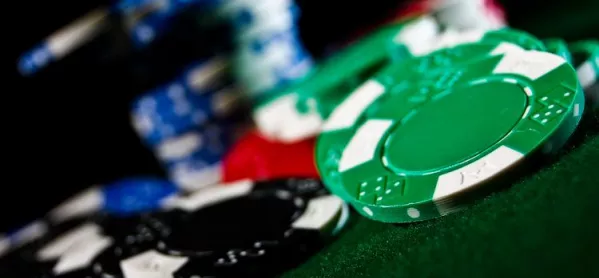- Home
- Gambling pupils scream with excitement as they learn, study finds
Gambling pupils scream with excitement as they learn, study finds

Classroom learning can generate the same thrill as gambling or riding a rollercoaster, when an element of chance is introduced, a new study suggests.
As a result, pupils’ minds are intensely focused on the task at hand, the research shows. They can even end up screaming with excitement as they learn.
Paul Howard-Jones, professor of neuroscience and education at the University of Bristol in the UK, believes, therefore, that the majority of lessons, in all subjects, should be taught using computer gambling games.
Using brain-imaging technology, Professor Howard-Jones examined the effects of a gambling-based rewards system on 24 postgraduate students. Competing against one another in teams of three, the students were awarded points for each question they answered correctly.
They then spun a “wheel of fortune”, which offered them a 50-50 chance of either doubling their points or losing all of them.
Professor Howard-Jones found that the area of the students’ brains that indicates distraction and inattention - “When they stopped thinking about the test they were being asked to do, and started thinking about what’s for dinner tonight” - was rarely active while they played the game.
By contrast, the brain’s dopamine responses - usually associated with more visceral pleasures, such as good food or sex - were generated by the game’s level of risk and reward.
The project is one of six trials being funded by the Wellcome Trust and UK grant-making charity the Education Endowment Foundation to see how neuroscience can improve education.
It will now be rolled out to classrooms across England: 10,000 Year 8 pupils will spend a year learning science using Professor Howard-Jones’s wheel-of-fortune game.
“It may work better with school pupils than university students,” Professor Howard-Jones said. “The evidence is that the reward-system response for risky decisions peaks at around 13 or 14. That may be why pupils that age are particularly addicted to video games.”
And he has already informally tested the game on small numbers of pupils. “To see children actually screaming with pleasure and excitement when tackling educational tasks is great,” he said.
School inspectors, he added, regularly emphasize the importance of consistent reward strategies for ensuring pupil motivation. But Professor Howard-Jones insists that, in his wheel-of-fortune game, it is the very randomness of the reward that increases pupils’ responsiveness.
“But it’s important that it’s not the teacher giving out points,” he said. “If the teachers were doing that, it would be seen as social injustice, which is demotivating.”
The initial trials have shown that the gambling technology can be used to ensure application, analysis and evaluation of information learnt, as well as memorization of facts. And because pupils’ answers are collated electronically, the teacher receives a large amount of information as to what individuals are and are not learning.
“All of this generates an immense amount of excitement and intense engagement,” Professor Howard-Jones said. He added that, while pupils do need time for quiet study and independent learning, the gambling game could be used in every academic subject.
“I do think that, at some point in the future, a great deal of learning will be delivered this way,” he said.
“Games in the classroom are sometimes trivialized - they’re just about making learning fun. But I think that trivializes their serious potential. We’re really missing a trick, if we don’t take it seriously. Learning can feel like you’re riding a rollercoaster.”
But Russell Hobby, general secretary of the NAHT headteachers’ union in the UK, questioned whether this was actually desirable. “An element of risk creates an element of excitement, and that’s motivational,” he said. “But should every moment of every educational day be thrilling? I’m not sure. Just doing everything for the thrill of the moment is not necessarily desirable.”
Want to keep up with the latest education news and opinion? Follow TES USA on Twitter and like TES US on Facebook
Keep reading for just £1 per month
You've reached your limit of free articles this month. Subscribe for £1 per month for three months and get:
- Unlimited access to all Tes magazine content
- Exclusive subscriber-only stories
- Award-winning email newsletters



